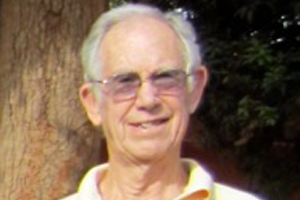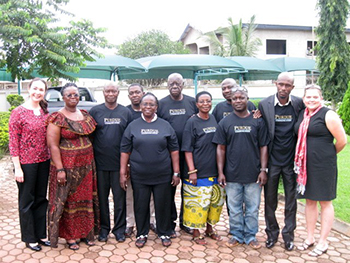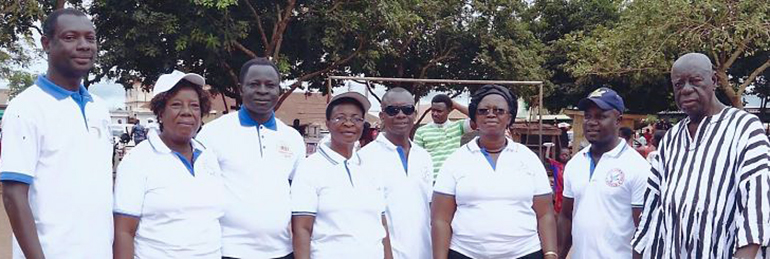Giving to Purdue
University Development Office
Milt Lauenstein: from corporate executive to peacemaker

In December of 2000, as New Year’s Eve approached, instead of identifying resolutions, one Purdue alumnus asked, “What can I do with the rest of my life?” In his mid-70s, the retired corporate executive had a new mission: reduce human suffering in the world.
Understanding that two major causes of human suffering are disease and war, Milt Lauenstein (ChE’45) set out to find ways he could use his resources effectively. “The idea of groups of people trying to kill each other, often from within the very same country, seemed so illogical and counter-productive that I decided to seek ways to reduce the incidence of war in the world,” he says.
Although Lauenstein had no academic or practical background in the peacebuilding field, he took the next couple of years getting acquainted with the experts. In 2003 he gathered a group of 10 professionals to advise him on what he might do that could actually contribute to peace in the world. Consisting of professors of political science and anthropology, heads of non-governmental organizations (NGO), and consultants in the field of peacebuilding, the group recommended Lauenstein fund efforts to encourage and assist local leaders to address local conflicts that threaten to lead to widespread violence.

“My service in the Navy and my professional career – awarded to me through a Purdue education – gave me occasion to visit many countries,” says Lauenstein. “In each, I saw capable people who were willing and able to work to solve community problems.”
Friends and family felt he was wasting his time and money on what they viewed as a quixotic venture but Lauenstein believed he had to try. “I knew the chance of making real impact that would decrease the incidence of war was slim,” he says. “But I also knew that if I didn’t try, I was certain not to accomplish anything.”
In 2004 he agreed to fund a test case in Guinea-Bissau in West Africa.
The goal: to prevent a continuation of the violence that had wrecked the country five years earlier. “On my first trip there, I met intelligent, energetic people eager to prevent war in their country,” says Lauenstein.
The 2005 national election in Guinea-Bissau was expected to result in widespread violence but with Lauenstein’s financial support, a group of local civil society leaders calling themselves The Citizens’ Goodwill Task Force, organized a campaign for orderly, peaceful elections, and members served as poll watchers to discourage violence. The initial election and run-off were both held with high participation and no incidents of violence.

Lauenstein convened an international meeting in 2006 to discuss how to build on the success in Guinea-Bissau. After 18 months of subsequent discussion and planning, an organization called BEFORE was formed and they began operations in Guinea, West Africa in 2008. While active there, two local conflicts were brought to their attention. BEFORE brought local leaders together to address the problems and in each case, their strategies for negotiations were successful and violence was averted.
In 2011, Lauenstein’s work caught the attention of Mohan Dutta, then associate dean in the College of Liberal Arts, professor of communication, and director of the Center on Poverty and Health Inequities at Purdue University.
Dutta had just wrapped up a project in Gary, Ind. where he took a community-based approach to health campaigns: working with local citizens to try and affect change that would be long-lasting and productive. Dutta’s interest in Lauenstein’s work led to an initiative within the College of Liberal Arts that could focus on political violence prevention and peacebuilding in West Africa: The Purdue Peace Project.
Stacey Connaughton, director of the Purdue Peace Project (PPP), associate head of the Brian Lamb School of Communication, and associate professor of communication at Purdue University explains, “The purpose of PPP is to work with local citizens and leaders to help them identify issues in their communities. We work actively with them, allowing the community to develop and lead the strategies and activities that will prevent political violence and foster peace.”
The PPP approach is grounded in the belief that leadership can be enacted by anyone. “You don’t necessarily need to be in a formal position of leadership to be a leader in your community,” says Connaughton. “From a research standpoint, the PPP is a wonderful opportunity to learn how everyday citizens can enact leadership that encourages peace, and make a difference in their own lives and their communities.
“For me, this project is meaningful not only because, in collaboration with local citizens, we hope to be making a lasting and positive impact on people’s lives but also because the project has potential to enhance what is known about political violence prevention, about leadership, and about local citizens’ role in all of that.”
Projects are selected based on whether or not the efforts and approach can stand a good chance of preventing the likelihood of political violence. “We do a lot of research before we agree to work in an area,” says Connaughton. “We have a program manager based in Ghana in West Africa who has a robust professional background in development and related areas. She brings a network and expertise to the program.”
Making sure a very inclusive and representative group of people are at the table, the PPP model works with citizens who then lead the violence prevention efforts. “That becomes important not only to ensure the strategies and activities for violence prevention are effective, but it also helps us promote a sustainable peace in the long-run,” says Connaughton. “As we continue to work and collect more data, we can determine whether this model is effective and work to make it even better.”
The PPP is about fostering conditions under which different groups can come together in a peaceful coexistence. Its involvement varies with each project but all are in-tune with the local context and focused on making sure the program presence does no harm. According to Connaughton, “Mr. Lauenstein and program team members feel very strongly that we should not be dictating, from West Lafayette, Ind., the sort of activities or strategies that are going to work in West Africa to prevent political violence. The most effective strategies are going to come from the communities themselves.”
Lauenstein is impressed with what the PPP is accomplishing and its potential for the future. “Elsewhere in the peacebuilding field, people are becoming more aware of the value and potential of contributions made by local leaders to the prevention or armed conflict,” he says. “The PPP is contributing to that trend.”
While other universities have programs on conflict resolution and peace studies, what makes the PPP unique is the nature of the local leadership approach it utilizes. Connaughton says, “We are also grateful for the fact that we are able, through the generosity of Mr. Lauenstein, to fund a group of graduate students who themselves have become very engaged and committed to violence prevention in West Africa.”
Through the hard work of all of its team members, the program is able to cultivate a systematic effort that combines getting results on the ground with scholarship and contribution to new knowledge. “At the end of the day,” says Connaughton, “we want to have something meaningful to contribute to the world about political violence prevention and peacebuilding and local leadership approaches to those important efforts.”
Lauenstein is hopeful about the future. “I’m optimistic that the money and effort I have contributed to the peacebuilding field will, in the end, prove to have been a good investment.”
Writer: Karen Pulliam, 765-494-3872, kjpulliam@prf.org
Sources: Stacey Connaughton, 765-494-9107, sconnaug@purdue.edu
Jessica Berns, jbberns@yahoo.com

